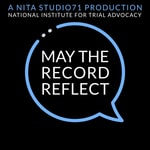May the Record Reflect – Détails, épisodes et analyse
Détails du podcast
Informations techniques et générales issues du flux RSS du podcast.

May the Record Reflect
National Institute for Trial Advocacy
Fréquence : 1 épisode/31j. Total Éps: 68

Classements récents
Dernières positions dans les classements Apple Podcasts et Spotify.
Apple Podcasts
🇨🇦 Canada - courses
12/08/2025#44🇺🇸 États-Unis - courses
23/07/2025#73🇺🇸 États-Unis - courses
09/07/2025#91🇺🇸 États-Unis - courses
28/06/2025#92🇺🇸 États-Unis - courses
27/06/2025#98🇺🇸 États-Unis - courses
26/06/2025#90🇺🇸 États-Unis - courses
25/06/2025#83🇺🇸 États-Unis - courses
24/06/2025#97🇺🇸 États-Unis - courses
23/06/2025#58🇺🇸 États-Unis - courses
22/06/2025#81
Spotify
Aucun classement récent disponible
Liens partagés entre épisodes et podcasts
Liens présents dans les descriptions d'épisodes et autres podcasts les utilisant également.
See all- https://www.ic3.gov/
69 partages
- https://www.ynharari.com/book/sapiens-2/
48 partages
Qualité et score du flux RSS
Évaluation technique de la qualité et de la structure du flux RSS.
See allScore global : 58%
Historique des publications
Répartition mensuelle des publications d'épisodes au fil des années.
58. It’s Greek to Me Ancient Rhetoric for Trial Lawyers, with Marian Grace Braccia
Épisode 58
mardi 10 septembre 2024 • Durée 01:12:16
When people hear the term “rhetoric,” they often think of words full of sound and fury signifying nothing. Yet that is a woeful misunderstanding of the beauty and power of persuasive language and argument. In this episode rife with back-to-school vibes, Temple Law Professor Marian Grace Braccia breaks down the where, how, and why rhetorical devices belong in oral and written advocacy; reveals why rhetorical devices have an massive impact, even on the cellular level, on finders of fact; refreshes your recollection on devices you already know while introducing others that belong in your repertoire; and totally geeks out about how fun, easy, and powerful they are to use.
Topics
3:30 The road to rhetoric
7:50 Definition of rhetoric and the Queen Philosophy
10:56 What are rhetorical devices?
11:59 The OGs of ancient rhetoric
18:43 Recent rhetoricians
20:59 Aesthetics of rhetoric
27:10 Where to deploy rhetoric at trial
29:12 Rhetoric in oral and written advocacy
33:00 Taking rhetoric too far
35:55 Easiest rhetorical devices to use
40:23 Obama the rhetorician
45:20 Tricolon and antanagoge
50:33 Sources of inspiration
54:09 Favorite devices
55:19 Wait . . . Taylor Swift?
57:40 Pop villains on trial
1:06:23 Signoff questions
Quote
“On an artistic level, rhetoric and the effective deployment of rhetorical devices give us emotional resonance and memory enhancement and aesthetic pleasure, and even surprise and novelty. Some rhetorical devices like irony or puns introduce the element of surprise and novelty, and they can be amusing or thought provoking, and they make the message more engaging, more memorable.” Marian Grace Braccia
Resources
Marian Grace Braccia (bio)
The Queen Philosophy (webpage)
Henry V: St. Crispin’s Day (video)
Renaissance Man: St. Crispin’s Day (video)
Rhetorical devices worksheet (available for download from Episode 58's show notes under Resources > Podcasts at nita.org)
57. 10 Things You Should Know about Trial Psychology
Épisode 57
mardi 13 août 2024 • Durée 01:07:56
Some of the most important heads to get into are those of the jurors seated for your trial. Fortunately, figuring out what makes people tick is both interesting and fun, and Temple University Director of Advocacy Programs Jules Epstein is here to share the lowdown. Whether he’s busting common courtroom myths, revealing how the camera lies, or delving into the cognitive process of jurors (and your very own self), Jules makes the case that knowing a little trial psychology can give you a competitive edge for the good of your clients.
Topics
4:02 Curse of knowledge
10:04 Goldfish attention span
13:47 Slo-mo evidence
19:16 Problems with graphic evidence
24:43 Visuals with words
27:28 Disconnect between science and law
36:30 Camera bias
43:21 Thought processes
48:55 Mythbusting
53:46 Go slow
56:12 Bonus lessons
1:00:15 Collective Wisdom
1:03:55 Signoff questions
Quote
“A visual guarantees that all twelve, or all eight, or all six jurors will know what something looked like.” Jules Epstein
Resources
Jules Epstein (bio)
NITA’s free Collective Wisdom articles (link) (latest)
Point Well Made: Persuasive Oral Advocacy (book)
48. That's Appealing, with Judge Randall Warner
Épisode 48
mardi 7 novembre 2023 • Durée 51:02
Every trial advocate enters the courtroom hoping for a “one and done” decision that favors their client. But appeals do happen, and if you’re waiting until the verdict is read before you start thinking about what comes next, you’re already bringing up the rear. Judge Randall Warner of the Superior Court of Arizona in Maricopa County joins the podcast to discuss the potential appeal issues you should be thinking about during litigation, the pretrial phase, and at trial; what issues are ripe for appeal (and which ones aren’t) and their impact on your trial strategy; and how to preserve the record for appeal in real time. He also lets you in on what he says are the most undervalued, hence underutilized, tools in your advocacy kit and how you should be using them to your advantage.
Topics
3:35 Different considerations for different trials
5:10 Common mistakes
6:13 Basics of appeals
8:59 Reverse-engineering your case
10:24 Appellate specialist on the trial team
11:22 Good appeal issues
13:00 Bundling your issues
14:10 Poor appeal issues
15:06 Pretrial preservation considerations
16:11 Motions in limine}
17:52 Bench memoranda
19:57 Preservation at trial
22:20 Objections and evidence
26:16 Staying in the judge’s good graces
27:17 Jury instructions
31:22 Verdict forms
38:49 Damages
40:38 Bench memorandum for jury instructions
42:12 Motion to acquit
45:26 Career advice to younger self
46:33 Signoff questions
Quote
“I’m a fan of bundling issues. So, for example, if you’ve got one issue that’s a sufficiency of evidence issue and another that’s a jury instruction issue and a third issue that’s an evidentiary objection or a couple evidentiary objections, and they all point to the same wrong result, those issues — independent of what the standard of review may be on any one of them — kind of work together to create an argument for prejudice for the case overall.” Judge Randall Warner
Resources
Judge Randall Warner (bio)
“All Mixed Up about Statutes: Distinguishing Interpretation from Application” (article)
“All Mixed Up about Mixed Questions” (article)
“Efficiency in Motion” (article)
47. Beginning the Effective Deposition, with Carl Chamberlin
Épisode 47
mercredi 11 octobre 2023 • Durée 01:26:49
At a time when more cases settle than go to trial, the deposition has become of utmost significance. Our guest Carl Chamberlin draws upon his experience taking and defending depositions in private practice as well as teaching deposition skills for 30 years. As the new author of The Effective Deposition, the topic is top of mind lately for Carl, so he joins us to talk about how to kick off a truly effective deposition with introductory matters and preliminary and substantive questioning techniques—and he even asks a few questions of his own.
Topics
3:22 The purpose of depositions
6:20 Difference between gathering information and obtaining information
10:38 Why depositions are important
12:30 Physical settings for remote depositions
14:15 The “usual stipulations”
17:20 Getting commitments
21:27 Commitments in remote depositions
24:42 Preliminary questions
29:51 Structure of substantive questioning
33:30 First demo
36:57 Key phrases for asking open-ended questions
38:25 And ones to avoid
43:01 Drilling down into a substantive topic
44:18 Second demo
1:04:19 Paying attention and listening
1:06:40 Using exhibits
1:10:15 Dealing with interruptions
1:13:56 Carl’s early depositions
1:16:53 The Effective Deposition
1:21:36 Signoff questions
Quote
“We want to make our questions clear and concise. Simple. The clearer the question, the better the answer. The fewer the objections, the more powerful it is.” Carl Chamberlin
Resources
Carl Chamberlin (LinkedIn)
NITA Publications (book)
46. The Secrets of Opening Statements, with Brooke Latta
Épisode 46
mardi 12 septembre 2023 • Durée 35:22
Content Warning: A brief, non-graphic mention of a sex crime case occurring from 29:34 to 30:49.
Everyone likes to start off on the right foot, and your opening statement is a crucial place to do it. It’s also Assistant U.S. Attorney Brooke Latta’s favorite part of trial, so she joined the podcast to discuss her best tips on telling the right story, using visual aids for maximum impact, and pulling out all the stops to captivate your jurors. She also talks about some of her own openings at trial and what she holds to be the G.O.A.T. of opening statements.
Timestamps & More
Topics
3:00 What’s fun about openings?
4:07 Rhetorical and legal goals
6:05 Crafting an opening
8:46 Workshopping it
10:54 Figuring out the right story to tell
13:00 Telling auditory stories for visual consumers
14:36 Some good don’ts
15:30 Visual aids
17:10 Court clearance for visual aids
19:01 Objections
21:53 Case weaknesses
23:50 Closing your opening
24:42 Openings and closings, compare and contrast
26:42 Brooke’s favorite example of a great opening
32:35 Signoff questions
Quote
“Something I always do is I talk to jurors like they are a friend that I’m having a martini with and I’m sitting across the table from. And I’m just talking to that friend about something that’s a very serious, very important issue — and I’m keeping it simple, I’m keeping it concise — so it’s a serious tone, but it’s casual.” Brooke Latta
45. Courtroom Demeanor, with Shareema Abel
Épisode 45
mardi 8 août 2023 • Durée 50:21
Without a doubt, knowing your client’s case up one side and down the other and understanding and applying the law are critical to your chances of prevailing at trial. But if your demeanor and presentation style lack polish, you might be getting in your own way. Special Counsel to the New York City MTA Inspector General and NITA Program Director Shareema Abel joins May the Record Reflect to talk about courtroom composure, interpersonal conduct, oral advocacy, self-expression, and so much more.
Topics
3:05 What is courtroom demeanor?
6:12 Demeanor in challenging situations
8:57 When you know the judge or opposing counsel
12:03 Vocal expression and body language
16:49 Personal style
22:55 Conduct outside the courtroom
26:12 Online proceedings
28:39 Picking yourself up on an off day
32:44 Cross-generational learning at the office
37:45 Neurodivergence
40:16 Feedback on your courtroom demeanor
44:58 Signoff questions
Quote
“Silence is one of the things that, over the years, I really had to get comfortable with in a courtroom because I remember wanting to fill every second of space and I thought silence was deadly. But as you grow in your career, you realize that you can use silence as a tool, and so oftentimes, especially when you forget a point, it’s ok to have a pregnant pause or use silence, and then return to a podium, to your notes, to remember what you’re saying. Or using silence to make a point after you ask a rhetorical question and using silence when you’re going from topic to topic, because my theory is you should never be talking and moving at the same time.” Shareema Abel
Resources Shareema Abel (LinkedIn) NITA Women in Trial (program) Deposition Skills: NYC (program) Building Trial Skills: NYC (program) NITA Women in Trial playlist (Spotify)
44. Unscripted Redirect, with Justin Bernstein and Spencer Pahlke
Épisode 44
mardi 11 juillet 2023 • Durée 47:42
NITA Education Director Rhani Lott Choi returns to May the Record Reflect, this time as guest host, to interview trial competition coaches Justin Bernstein and Spencer Pahlke. You may know Justin and Spencer from Unscripted Direct, the trial advocacy podcast for the law school community. Tune in to this blast from your mock trial past to hear about how advocacy skills transfer from law school to law practice to life; the forgotten lessons of mock trial that you should resurrect; and how learning, practicing, and teaching are part of a career-long cycle for the skilled advocate.
Timestamps & More
Topics
4:44 Unscripted Direct podcast
5:57 Trial advocacy community
9:58 Tough conversations about DEI
13:11 Building a legal podcast
14:48 Intersection of mock trial and trial practice
16:41 Three important lessons from mock trial
19:03 New practice pointers gleaned from podcasting
22:04 Life lessons from mock trial
26:01 Former students as colleagues
28:10 Things unlearned from mock trial
32:12 Why trial skills are important for all lawyers
33:30 Misconceptions about mock trial’s value
36:47 Keeping skills sharp
39:46 Skills transfer
42:58 Signoff question
Quote
“The biggest challenge the jurors have is they weren’t there when these things happened, so helping them feel like they are there, they’re watching things, even if it’s just through the narration of a lawyer, is incredibly powerful and it sort of sears into their memory.” Justin Bernstein
Resources
Justin Bernstein (bio)
Spencer Pahlke (bio)
Unscripted Direct (podcast)
Episode 5 (Adam Shlahet)
Episode 48 (Ben Rubinowitz)
Episode 51 (Rhani Lott Choi)
AvaTax
43. Can I Get a Witness?, with Hon. Chris Whitten
Épisode 43
mardi 13 juin 2023 • Durée 49:03
You may see depositions as your golden opportunity to preserve testimony, elicit admissions, and test theories—but for your witness, depositions are a veritable stewpot of jangled nerves and apprehension. In this episode, Maricopa County Superior Court Judge Christopher Whitten shares what you can do to ensure your witness walks into a deposition feeling at ease with the process and ready to handle even the toughest questions. Judge Whitten reflects on role-playing, using video as a prep tool, broaching difficult topics, responding to objections, and testifying live versus livestream—and that's just for starters.
Topics
2:35 Confident witnesses
3:53 Is witness prep privileged?
5:30 Procedural comfort
13:54 Objections during testimony
16:06 Substantive prep
22:57 Tough questions and role-playing
24:36 Using video in prep
26:38 Theory and theme testing
29:12 Common pitfalls
32:04 Testimony via Zoom versus face-to-face
38:15 Reluctant witnesses
42:36 Expert witness prep
46:03 Signoff question
Quote
“When you have a problem with the witness, it’s because you didn’t prepare enough.” Hon. Chris Whitten
Resources
Hon. Chris Whitten (bio)
Building Trial Skills: San Diego (course)
The Ins and Outs of Jury Selection (webcast)
En Banc: Judges’ Perspectives on Remote Hearings (webcast)
“Can I Get a Witness?” (video)
42. Direct Neglect Where Is the Love, with Hon. Amy Hanley and Dennericka Brooks
Épisode 42
mardi 9 mai 2023 • Durée 53:42
How many of us cue up the “sad trombone” every time we think of doing direct examination? Direct is renowned for being a boring slog through facts and faces as we make on our way to the fireworks of cross and closing. Yet, if you’re not using direct to tell a clear, persuasive story, you’re going to lose your case. According to Judge Amy Hanley and Dennericka Brooks, when you approach direct with the same zest as you do cross, you’ll get the best out of your witnesses, avoid rambling or baffling testimony, and tell the tale jurors are keen to hear.
Topics
3:42 Why don’t people love doing direct?
6:44 Common mistakes
10:49 Telling the story
12:18 Organizing your direct
14:09 Headnotes
16:29 Exhibits, visuals, and demonstratives
22:36 Witness prep
27:55 Reluctant or difficult witnesses
35:00 Bad facts
40:57 Demeanor
46:00 Redirect
49:55 Signoff question
Quote
“I will say, first and foremost, that you have to be prepared that no matter how well you prepare a witness, they will get on the stand and say something they weren’t supposed to say, something that will throw you off. It’s just going to happen.” Dennericka Brooks
Resources
Hon. Amy Hanley (bio)
Dennericka Brooks (bio)
NITA Women in Trial (course)
The Tense Trio (podcast)
Direct Examination: Being the Guide for Your Jury (webcast)
Harnessing Your Power on Cross-Examination (webcast)
41. Slipstreams and Wormholes, with Rhani Lott Choi
Épisode 41
mardi 11 avril 2023 • Durée 47:10
The profession of trial lawyering has a steep, intense learning curve requiring years of practice (and “practice”) before you begin to feel like you’ve got a grip on it. What if you could shave years off that timeline. NITA’s Education Director Rhani Lott Choi rejoins the podcast to talk about how trial lawyers can compress time through wormholes, slipstreams, and mentorship.
Topics
5:00 Time compression through wormholes
22:30 And slipstreams
29:34 And mentorship
34:22 A word about Parkinson’s Law
42:28 Signoff Question
Quote
“I’ve worked at places where you have formal mentorship, which can be great, but often that does not continue past the employment relationship. And especially these days people change jobs all the time. The mentorship, for me, at NITA has been so valuable because it transcends that. It’s not based on a job or a connection ... NITA just encompasses everything, through career changes, through types of practice . . . .” Rhani Lott Choi
Resources
Rhani Lott Choi (bio)
Slipstream Time Hacking: How to Cheat Time, Live More and Enhance Happiness (book)
Tomato Clock (Chrome extension)
Direct Examinnation: Being the Guide for Your Jury (webcast)









